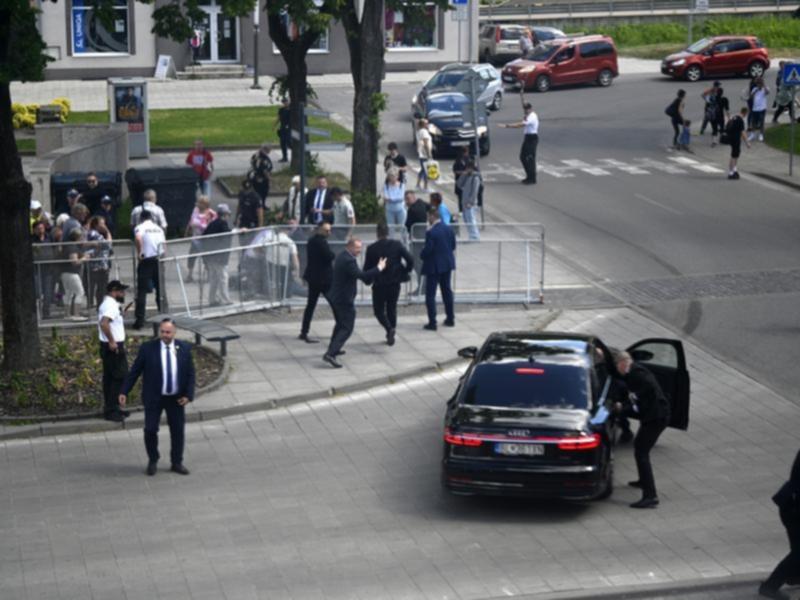Shot Slovak PM Minister Robert Fico no longer in life-threatening condition after assignation attempt
Slovakian Government officials have shared an update on Prime Minister Robert Fico after he was shot multiple times in an assassination attempt.
Slovak Prime Minister Robert Fico is no longer in a life-threatening condition after he was shot in an assassination attempt when leaving a government meeting, a government minister says.
The gunman shot Fico, 59, five times, initially leaving the prime minister in critical condition and undergoing surgery hours later on Wednesday evening.
“I was very shocked ... fortunately as far as I know the operation went well - and I guess in the end he will survive ... he’s not in a life-threatening situation at this moment,” Slovak Deputy Prime Minister and Environment Minister Tomas Taraba told the BBC’s Newshour.
Sign up to The Nightly's newsletters.
Get the first look at the digital newspaper, curated daily stories and breaking headlines delivered to your inbox.
By continuing you agree to our Terms and Privacy Policy.Taraba said one bullet went through Fico’s stomach and a second hit a joint.
News outlet Aktuality.sk cited an unnamed source saying Fico was out of surgery and in stable condition.
Defence Minister Robert Kalinak told a news briefing hours earlier that Fico had suffered “serious polytrauma” after several shot wounds.

The shooting in the central Slovak town of Handlova, which Slovak media said was carried out by a 71-year-old man, stunned the small central European nation and drew international condemnation.
Slovakia, a member of NATO and the European Union, has little history of political violence. Russian President Vladimir Putin and US President Joe Biden joined Slovakia’s EU partners in expressing shock and condemnation of the shooting.
The country of 5.4 million has seen polarised political debate in recent years, including the hard-fought presidential election last month that helped tighten Fico’s grip on power.
Since returning as prime minister in October, Fico has shifted policy quickly. Opposition critics call it a power grab.
His government has scaled back support for Ukraine while opening dialogue with Russia, sought to weaken punishments for corruption and dismantled a special prosecutor’s office, and is revamping the RTVS public broadcaster despite calls to protect media freedom.
After the attack, Fico was rushed to hospital in Handlova where he had been chairing a government meeting. He was then transported by helicopter to regional capital Banska Bystrica for urgent treatment, it said, adding that his condition was too serious for him to be taken to Bratislava.
A Reuters witness heard shots as Fico exited a building to shake hands with a crowd of people who had been waiting to greet him. Police then wrestled a man to the ground.
Slovak news media reported the shooter was a former security guard at a shopping mall, an author of three collections of poetry and a member of the Slovak Society of Writers. News outlet Aktuality.sk cited his son as saying his father was the legal holder of a gun licence.
“I have absolutely no idea what my father intended, what he planned, what happened,” it quoted the son as saying.
Broadcaster TA3 reported the leftist prime minister had been hit in the abdomen in the attack.
“I don’t think I will wake up from this,” 66-year-old Lubica Valkova told reporters on the scene. “This kind of thing just can’t happen in Slovakia.”
Fico, a dominant force in Slovakia for two decades, has drawn criticism for taking a more pro-Russian stance in the Ukraine war.
Describing the shooting as a “monstrous” crime, Putin said in a telegram sent to Slovakia’s President Zuzana Caputova: “I know Robert Fico as a courageous and strong-minded man. I very much hope that these qualities will help him to survive this difficult situation.”
Biden offered US help to Slovakia, saying in a statement: “We condemn this horrific act of violence.”
Slovakia’s biggest opposition party Progressive Slovakia called off a planned protest and called for restraint to avoid escalating tensions. Parliament suspended debate indefinitely after the attack.
Fico was forced to resign as premier amid mass protests in 2018 triggered by the contract killing of Jan Kuciak, a journalist who had been investigating high-level corruption. Those protests exacerbated divisions in Slovak society that still linger.
